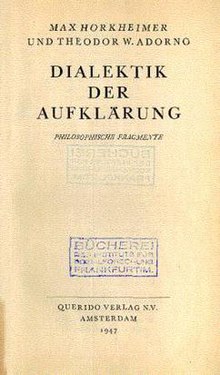Dialectic of Enlightenment
 |
|
| Author |
Max Horkheimer Theodor W. Adorno |
|---|---|
| Original title | Dialektik der Aufklärung |
| Country | Germany |
| Language | German |
| Subject |
Philosophy Sociology |
|
Publication date
|
1947 |
|
Published in English
|
1972 |
| Media type | Print (Paperback) |
| Pages | 304 |
| ISBN | |
| OCLC | 48851495 |
| 193 21 | |
| LC Class | B3279.H8473 P513 2002 |
Dialectic of Enlightenment (German: Dialektik der Aufklärung) is a work of philosophy and social criticism written by Frankfurt School philosophers Max Horkheimer and Theodor W. Adorno and first published in 1944. A revised version appeared in 1947.
One of the core texts of Critical Theory, Dialectic of Enlightenment explores the socio-psychological status quo that had been responsible for what the Frankfurt School considered the failure of the Age of Enlightenment. Together with The Authoritarian Personality (1950; also co-authored by Adorno) and Frankfurt School member Herbert Marcuse's One-Dimensional Man (1964), it has had a major effect on 20th century philosophy, sociology, culture, and politics, inspiring especially the New Left of the 1960s and 1970s.
One of the distinguishing characteristics of the new Critical Theory, as Adorno and Horkheimer set out to elaborate it in Dialectic of Enlightenment, is a certain ambivalence concerning the ultimate source or foundation of social domination. This ambivalence gave rise to the “pessimism” of the new Critical Theory over the possibility of human emancipation and freedom.
This ambivalence was rooted in the historical circumstances in which Dialectic of Enlightenment was originally produced: the authors saw National Socialism, Stalinism, state capitalism, and mass culture as entirely new forms of social domination that could not be adequately explained within the terms of traditional Critical Theory.
...
Wikipedia
